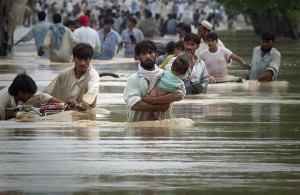What About the Bottom Billion?
Posted on 24. Nov, 2010 by astark in U.S.A.

image -Action Aid
One of the most important issues that will be decided this December in Cancun is how to help the poorest and the most vulnerable people adapt to the inevitable impacts of climate change. All parties agree that the developed countries, as the only historical emitters of greenhouse gases and with the most resources, bear the responsibility of helping these countries and peoples adapt.
In Copenhagen last December, most countries agreed in principle to the Copenhagen Accord, which commits developed countries to give $30 billion in “fast start financing” by 2012 and to help raise, through public, private and other sources, $100 billion per year by 2020 to help the least developed and most vulnerable countries with mitigation and adaptation. Discussions over finance and adaptation where both robust in Tianjin this October. Yet according to several negotiators that I’ve spoken to, the discussions haven’t moved past architecture to discussing how this money would actually be spent. These discussions are essential to making sure that climate change adaptation efforts for the poorest people in the world are effective.
I’m lucky enough to have a really fun day job here in D.C., and on Monday I had the opportunity to attend a meeting held by  ActionAid, a non-profit that designs and implements innovative development projects all over the world, as well as doing some advocacy work in Washington, D.C. The meeting featured Harjeet Singh, responsible for working with local communities to design and implement ActionAid’s climate change adaptation programs in Asia. He noted that some of the impacts of climate change that will be most devastating to poor communities include more frequent and severe natural disasters, less access to freshwater, food insecurity, coastal erosion and salination and health issues including increased incidence of malaria and cholera. As the floods in Pakistan this summer clearly demonstrated, people are already experiencing these impacts-they are not just predictions for the future anymore. And the people that will be affected first are the poorest people in the world, who also have the most limited abilities to cope with disasters and uncertainty. The impacts of climate change could prove disastrous for development efforts, including the Millennium Development Goals, in the developing world, as they have already begun wiping out homes and livelihoods.
ActionAid, a non-profit that designs and implements innovative development projects all over the world, as well as doing some advocacy work in Washington, D.C. The meeting featured Harjeet Singh, responsible for working with local communities to design and implement ActionAid’s climate change adaptation programs in Asia. He noted that some of the impacts of climate change that will be most devastating to poor communities include more frequent and severe natural disasters, less access to freshwater, food insecurity, coastal erosion and salination and health issues including increased incidence of malaria and cholera. As the floods in Pakistan this summer clearly demonstrated, people are already experiencing these impacts-they are not just predictions for the future anymore. And the people that will be affected first are the poorest people in the world, who also have the most limited abilities to cope with disasters and uncertainty. The impacts of climate change could prove disastrous for development efforts, including the Millennium Development Goals, in the developing world, as they have already begun wiping out homes and livelihoods.
Yet poor people are not are not only victims of climate change. They are also taking action as we speak to deal with these destabilizing impacts, including changing cropping patterns and adopting drought and flood-resistant crops. ActionAid’s approach to adaptation relies less on developing new technologies, and more on working with local communities to inform them about the long-term impacts of climate change, understand their needs and what capacities they may already have to adapt. They help communities to be able to measure the impacts of climate change locally, and form civil society networks to lobby local government to increase its own capacity to respond to disasters and enable adaptation efforts. They work with local schools to educate communities about climate change, as well as with local and national media to build public opinion. At the policy level, they also work with governments to create and disseminate disaster response plans, to integrate adaptation into poverty-reduction strategies, promote sustainable agriculture and promote actions from civil society.
Issues around working with local communities, integrating conflict and gender sensitivity into programs and finding environmentally sustainable adaptation mechanisms will all be essential for poor communities to not only cope with climate change, but build resilient and sustainable societies over the long-term. The UNFCCC negotiators must be careful to create a financial architecture that keeps in mind not only the interests of all country parties, but the poorest and most vulnerable people all over the world.
======
video addendum: check out this powerful footage from a recent ActionAid trip to flooded regions of Pakistan.
Negotiator Tracker - Alex Stark
Alex Stark joins the project from Washington DC, where she's focused on legislation addressing drivers of violent conflict around the world, including the effects of climate change. Tracking the US negotiators and getting the word out about action inside the UNFCCC combine her passions for activism, sustainable development, conflict prevention and US foreign policy. read more»
Read more of Alex's posts here.
Follow Alex on twitter @AlexMStark






